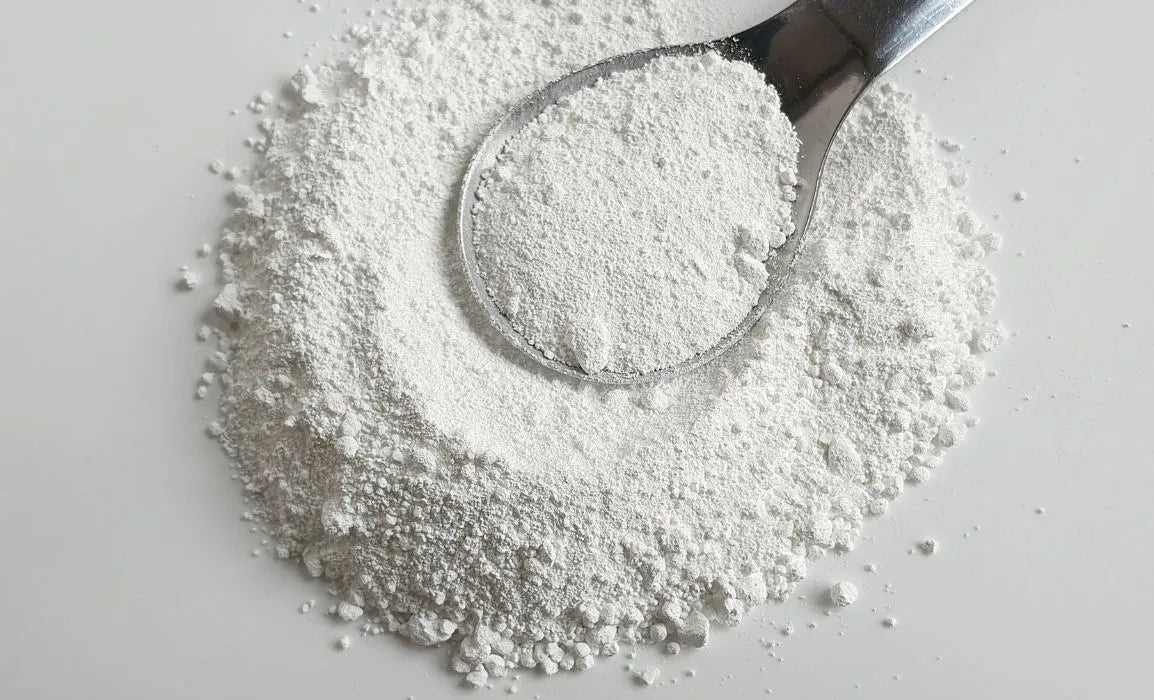Titanium Dioxide in skincare
- Introduction
- What is Titanium Dioxide?
- What Does Titanium Dioxide Do in Skincare Products?
- How is Titanium Dioxide Different from Zinc Oxide in Sunscreens?
- Titanium Dioxide Benefits in Skincare
- Is titanium dioxide for skin safe to use?
- Is Titanium Dioxide Good for Sensitive Skin?
- Precautions While Using Titanium Dioxide
- Conclusion

Introduction
Titanium dioxide (TiO2) serves the purpose of UV absorption and acts as a whitening agent and is incorporated in some skincare products like sunscreens, powders and even loose powders. The usage of titanium-bearing minerals is non-toxic, even when applied to any dermal lotions and creams. It is classified as a probable carcinogen by the International Agency for Research on Cancer. No suitable data on the health effects of titanium dioxide within the size range of nanoparticles was found.
What is titanium dioxide?
To enhance the protection level, titanium dioxide is included in mineral-based sunscreen formulations to reflect UVA and UVB rays of the sun. It is an ingredient that is safe for use in SPF products and a good broad-spectrum UV Filter due to its ability to reduce the chance of sunburn or UV-induced skin damage.
What does titanium dioxide do in skincare products?
Titanium dioxide is particularly used in skincare formulations meant for the skin, primarily for its sun-blocking properties. This is useful in protection against skin damage because it helps in deflecting and absorbing UVA and UVB rays, which are the main causes of ageing skin and skin cancer among other skin adverse effects. Also, due to the covering ability of sunscreen products, titanium dioxide is used in various other cosmetic ingredients along with foundations and powders.
How is titanium dioxide different from zinc oxide in sunscreens?
It is common to find Zinc oxide (ZnO) and Titanium dioxide (TiO2) as primary ingredients for topical sunscreens. However, there is some notable difference. In comparison to titanium dioxide, zinc oxide extends the range of the UV spectrum. Zinc oxide along with titanium dioxide can help provide UVB protection for blocks. Zinc oxide is whiter than titanium dioxide and therefore less cosmetically appealing when using products that should be transparent or with some skin tones.
Titanium dioxide benefits in skincare
The benefits of titanium dioxide as an active agent in skincare.
- It offers broad-spectrum protection: Titanium dioxide offers broad-spectrum protection that defends against both UVA and UVB rays.
- Good for sensitive skin: Titanium dioxide is kind of hypoallergenic and non-comedogenic, making it a good option for sensitive-skinned people.
- Provides instant protection: Titanium dioxide sunscreens offer immediate protection, as compared to many chemical sunscreens, which typically take 20 min before they can take effect.
- Long lasting: Titanium dioxide is also water and sweat-resistant, making it a great choice for outdoor activities such as beach outings.
Is titanium dioxide for skin safe to use?
Since there is no reactiveness to titanium dioxide, it is a safe ingredient in the usual skincare regime and is categorised as a zero-active substance.
Is titanium dioxide good for sensitive skin?
Titanium dioxide is also suitable for sensitive skin. It is non-irritating and can be applied to all skin types. In addition, it assists in avoiding the effects of sunburn and damage to the skin.
Precautions while using titanium dioxide
The advice on avoiding certain risks that might arise when carrying out topical applications of titanium dioxide in some skincare preparations are as follows:
- Particle size of ingredient: There is a need not to use nano-titanium dioxide or ultrafine titanium dioxide on the skin surface as they may pose some risks.
- Do not inhale: A form of titanium dioxide that is powdered can be harmful if inhaled, so avoid spray products.
- Sun sensitivity: Ensure that it is made up of the proper formulations for proper protection against sun rays. This is because titanium dioxide is a physical UV blocker.
- Allergy concerns: A patch test is recommended, especially for sensitive skin, because some minor irritation may occur for allergic people.
Conclusion
Titanium dioxide compound is popular and often preferred for its excellent function of blocking UVA and UVB rays. It is also non-irritating and non-comedogenic. It is safe to be applied around the eye since it does not cause any irritation or burning sensation.

